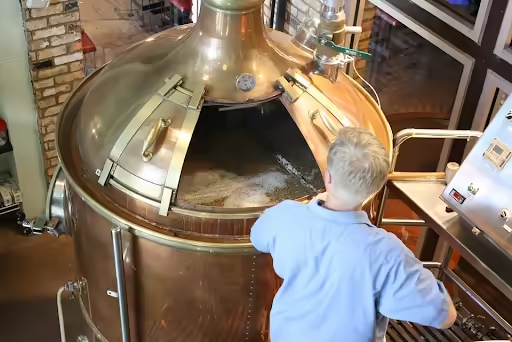If you're the proud owner of a brewery, you know that there's a lot that goes into keeping things running smoothly. From keeping your brews at the perfect temperature to making sure your equipment is properly maintained, there's a lot to think about!
But don't worry - we've got you covered. Here are five tips to help keep your brewery running like a well-oiled machine
1. Use Software to Help You Manage Your Brewery Operations
If you want day-to-day operations to run smoothly, you need to have an easy-to-use system for processing orders, maintaining inventory levels, receiving payments, managing brewery production, and generating reports.
When you use the brewery software from Ollie, you get all of that in a single platform.
By adopting industry-specific management software, you can do things like process orders and grow B2B sales faster, track raw material forecasts, and much more.
Basically, if you want to ensure operations always run efficiently and smoothly, you need an excellent system in place to achieve it. Brewery software helps you to do just that.
2. Keep on Top of Your Finances
Any successful business owner knows that he or she needs to always keep on top of finances.
Even if you hire an accountant to do your books, you must stay informed about things like profit and loss.
So, always be aware of your business’s financial state by regularly looking over your books.
3. Perform Preventative Maintenance
While it’s crucial that you stay on top of the financial and ordering sides of your business to ensure your business runs smoothly, it’s just as important to remember to look after your equipment.
After all, if your equipment fails, you can’t produce beer. And if you can’t produce beer, you won’t be able to sell it.
So, performing preventative maintenance periodically, perhaps once a year, is a step that every brewery should take to ensure smooth operational running.
There are multiple benefits of performing preventative maintenance, including ensuring you keep your production downtime to a minimum, helping you to save money because you’ll have fewer critical repairs, increasing the lifespan of your equipment, and promoting health and safety among your team.
4. Introduce New Beers
If you want to become an industry leader, or at the very least grow your company, you’ll need to mix things up from time to time. That means introducing new beers.
Whether you introduce new beers into your sales channels on a permanent basis or you create special and seasonal beers with limited runs, it’s important that you keep accurate records in order to tweak and refine your recipes.
So, make sure your employees take relevant notes to help you improve your recipe and create the finest beers.
For instance, you should record data points like the pH of the mash, the post-boil volume, gravity and pH, the collection temperature to the FV, and much more.
5. Hire the Right Candidates
When you take steps like those above, you can ensure your brewery continues to run smoothly even if you have a high turnover of employees.
But you can take steps to prevent high turnover from happening in the first place.
It partially comes down to hiring the right candidates. When you know what to look for in potential employees, you can ensure you hire the right people for the vacant positions.
You also need to take a look in the mirror. You need to ensure your workplace is a positive and happy place in which communication and respect are at the forefront if you want to hang on to your employees.
Ensuring Operations Run Smoothly When You Have High Turnover
If you haven’t yet fixed your high staff turnover problem, you need to take steps to ensure everything runs smoothly when workers leave.
So, you should:
- Keep team spirits up.
- Maintain an open-door policy so you’re always available when employees need to talk.
- Help your employees to adapt to operations when key members of staff leave.

